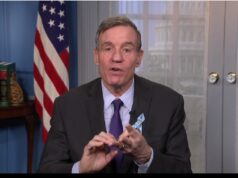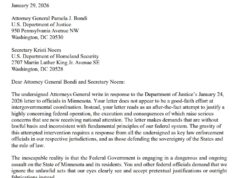I strongly agree with both Rep. Bobby Scott (see video) and Rep. Gerry Connolly (see his statement below). This amendment is gimmicky nonsense — counterproductive, dangerous, and utterly mindless demagoguery. Congress should NOT pass this monstrosity.
Statement on Balanced Budget Amendment
Rep. Gerald E. Connolly, VA 11
U.S. House of Representatives
November 18, 2011Today this House will vote on the momentous issue of whether to amend the Constitution of the United States. All of us should understand that this is no symbolic vote. This is not a routine legislative act, not another amendment or bill we are considering. We are asked to consider amending the most sacred document of a free people with a provision not contemplated by the Founders. The argument is propounded that the times demand it and that there is no other choice, given the size and import of our current debt posture. Public opinion favors it.
But as legislators we must hold ourselves to a higher threshold to amend the Constitution. Is the proposal essential? Did the Founders fail to consider the issue that now must be addressed in and only in a constitutional framework? Is there no legislative remedy? What are the negative and foreseeable consequences of such a constitutional mandate? And importantly, we must remember that, but for one, all constitutional amendments are written in indelible ink.
Desirous of a balanced budget, eager to return our fiscal policy to robust health, I must regrettably oppose the proposed amendment before us. It does not pass the higher constitutional threshold we must insist upon. We balanced the budget just a decade ago-for four consecutive years-without such an amendment. It was a matter of political will, fiscal discipline, and successful economic growth. There is no evidence that such potential cannot be resurrected. There is ample evidence, however, that this institution lacks the will and courage to undertake the policy changes necessary to effectuate a reasoned and balanced budget.
Political failure can and must be addressed here and, failing that, at the ballot box. The corrective is forging a political consensus, not amending the Constitution. In fact, to leap to the latter as an expedient is to admit the collapse of our democratic institutions and to abandon all faith in our collective ability to respond to one issue, albeit a major one, of the day. I refuse to recant my faith in our ability to make the difficult choices necessary to achieve the desired goals of debt reduction and balanced fiscal performance.
The proposed amendment also fails another test: do no harm. Had this amendment been in place during this economic contraction we would have had no fiscal tools with which to respond. We would have abandoned the economic field to the Darwinian forces at work and guaranteed that the great recession became the Second Great Depression, condemning our citizens to their own fate, one which would have been characterized for a generation with want, double digit unemployment, and endemic poverty. Why would any member of this body consciously choose such a course, especially when there are alternatives, though painful ones? Perhaps, it is easier to pander to the clamor of the moment, or to seek out the seductively easy answers. Perhaps we seek to mask an ideological agenda to starve government investment cloaked in the more respectable argument of a constitutional amendment made necessary to balance the budget.
For me, the Founders’ silence on this matter in the Constitution was intentional. They understood and expected that Congress would meet its duties and do its job.



![[UPDATED 1/29/26] Audio: Sen. Tim Kaine Talks to Blue Virginia About His “Five-Point Plan” to Fight Trump’s Orban-Like Assault on US Democracy; Civil Disobedience a la MLK Jr.; Trump’s Bogus “Energy Emergency”; the Crucial Importance of the 2025 VA Elections; etc.](https://bluevirginia.us/wp-content/uploads/2025/02/kaineinterview2-238x178.jpg)






![[UPDATED 1/29/26] Audio: Sen. Tim Kaine Talks to Blue Virginia About His “Five-Point Plan” to Fight Trump’s Orban-Like Assault on US Democracy; Civil Disobedience a la MLK Jr.; Trump’s Bogus “Energy Emergency”; the Crucial Importance of the 2025 VA Elections; etc.](https://bluevirginia.us/wp-content/uploads/2025/02/kaineinterview2-100x75.jpg)
